MercoPress. South Atlantic News Agency
Tag: Central Bank of Uruguay
-
Saturday, July 9th 2022 - 10:03 UTC
Uruguay Central Bank raised interest rate policy 50 basis point to 9,75%

Uruguay's Central Bank of Uruguay this week ordered a 50 basis point increase in the interest rate policy, the eighth straight increase since last August. The move, which brings the monetary policy rate to 9.75%, means the central bank has ordered 525bp of increases in total over the past 11 months. The 50bp hike was somewhat smaller than the four previous hikes, which included April’s 125bp increase and three 75bp hikes.
-
Wednesday, May 18th 2022 - 09:58 UTC
Uruguay central bank increases rate, anticipates a 'contractive monetary policy' to combat inflation

Uruguay's central bank on Tuesday announced an increase of 75 basis points to 9,25%, in its monetary policy reference rate, meaning also the bank has entered the contractive phase, as so many other Latin American central banks, in an effort to rein in inflation.
-
Thursday, March 24th 2022 - 09:31 UTC
Uruguay's economy grows 4.4% in 2021, Central Bank says
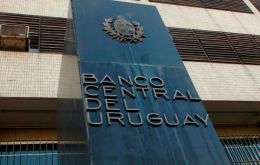
According to a study by Uruguay's Central Bank released Wednesday, the country's economy has grown 4.4% in 2021, despite all COVID-19 restrictions. The new figures show a recovery from 2020's fall due to the sanitary measures in force, which led to a decline in GDP of 5.9%.
-
Wednesday, February 9th 2022 - 22:08 UTC
No harm in Uruguay's banking system dollarized, Moody's report says
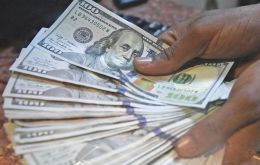
Although 76% of deposits in Uruguayan banks are in US dollars, credit rating consultants Moody's have said there was nothing to fear.
-
Tuesday, August 17th 2021 - 11:15 UTC
Uruguay central bank raises “price of money” reference from 4,5% to 5%
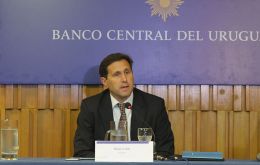
The Uruguayan central bank following the meeting of its Copom, Monetary Policy Committee, decided last week to raise the basic monetary policy rate from 4,5% to 5%, in line with what has been happening in other central banks in the region.
-
Thursday, July 29th 2021 - 07:46 UTC
Uruguay economy forecasted to grow 3,5% in 2021, with inflation above target, Central bank report

The Uruguayan Central bank in its second-quarter Monetary Policy report forecasted a 3,5% expansion for the country's economy, the same as the estimate of the Finance ministry, but anticipated higher inflation because of an increase in public rates and commodities.
-
Wednesday, July 14th 2021 - 09:00 UTC
Uruguay central bank leaves reference rate unchanged waiting for stronger recovery signals
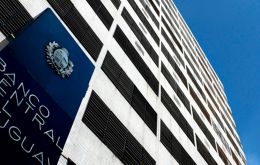
The Uruguayan central bank is waiting for stronger signals of economic recovery before altering the current monetary policy, according to a release from the Monetary Policy Committee, Copom. In its third 2021 meeting, at the end of June, it ratified the current reference interest rate of 4,5% and anticipated it will wait for improved indicators from the pandemic battered economy.
-
Thursday, June 24th 2021 - 09:22 UTC
Uruguay's blooming economy shows covid-induced setback

Uruguay's Gross Domestic Product (GDP) fell 2.8% in the first quarter of 2021 compared to the same period of 2020, according to a Central Bank (BCU) report released Wednesday.
-
Thursday, May 6th 2021 - 09:33 UTC
Uruguay's inflation projected at 6.8% year on year fits within government’s target

Uruguay has managed to keep inflation at 6.8%, which is within the government's target range for the first time in 36 months, it was announced Wednesday.
-
Friday, April 23rd 2021 - 22:08 UTC
Uruguay's Central Bank concerned about growth projections for 2021 in coronavirus context
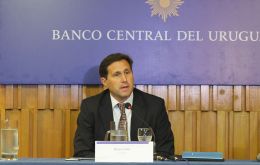
Uruguay's Central Bank Friday released its report for the first quarter of 2021 which highlighted the entity's concern regarding “three relevant risks” in a growth scenario of just 3.5% this year.
